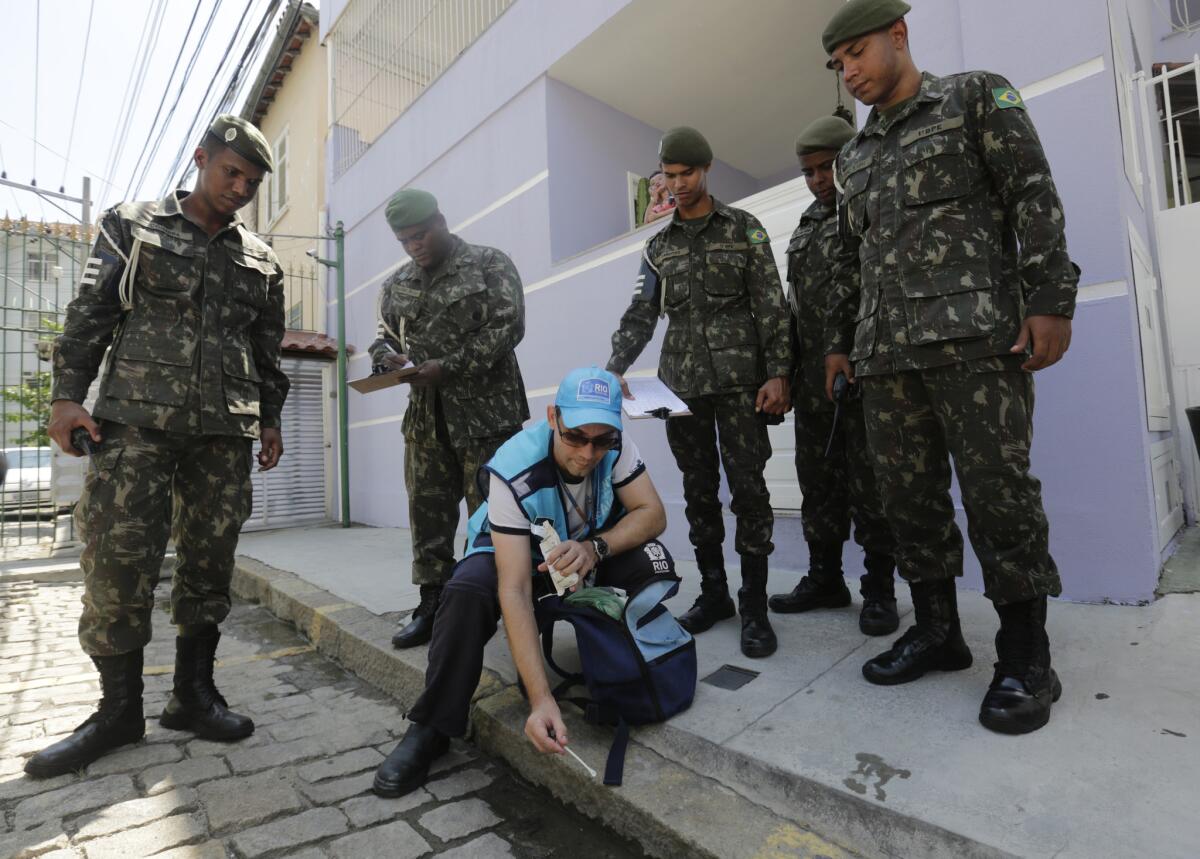Editorial: With no reproductive rights, many Latin American women could be at the mercy of the Zika virus

Surrounded by soldiers, a government health agent working in the Tijuca neighborhood of Rio de Janeiro uses larvicide to kill mosquitos that spread the Zika virus.
Now that researchers have identified a tangible link between the Zika virus and fetal brain deformation, pregnant women and those of childbearing age in the Latin American countries hardest hit by the mosquito-borne virus will have to make tough decisions about their reproductive future. Use birth control? Abstain? Abort if there’s evidence of potentially lethal birth defects?
Or at least that’s how it ought to go.
In reality, women in many Latin American countries have almost as little control over their bodies as they do the weather. They are subject to rampant sexual violence, have received little or no sex education and may have limited access to birth control. When they do get pregnant, abortion is illegal in most countries, though some have exceptions in cases of rape, fetal impairment or danger to the life of the mother. In El Salvador the strictures are particularly harsh. There are no legal abortions, and women may go to jail for the “crime” of suffering miscarriage.
Catholic leaders have said unequivocally that Zika changes nothing about the church’s stance against birth control, let alone its ban on abortion.
These realities make the paltry governmental response in El Salvador and like-minded countries — warning women not to get pregnant until the Zika crisis is over — all the more ludicrous. Just how does it help to scare women while offering no tools or information? It’s unrealistic, and even irresponsible, to expect women to somehow stave off pregnancy when birth control isn’t an option and rape is widespread. Although condoms are easily accessible, they can be unaffordable to poor women. Emergency contraceptives are even pricier or, in the case of Honduras, banned outright.
The World Health Organization declared Zika an international public health threat Feb. 1 based on its “explosive” spread throughout the Americas and the Caribbean. At the time, medical experts strongly suspected that the virus was implicated in microcephaly in more than 4,000 newborns in Brazil and feared that might be related to an uptick in another neurological condition, Guillain-Barré syndrome.
Since then, the evidence connecting Zika to microcephaly has mounted. Last week researchers in Slovenia confirmed microcephaly, brain injury and the Zika virus in the brain of a fetus whose mother had gotten pregnant while in Brazil. This week, researchers in Brazil said they found the virus in the brains of two infants with microcephaly who died just hours after birth. More studies will be needed before the Zika connection is certain, but it’s not looking good.
Complicating the unfolding crisis is the assertion by a group of Argentine physicians that the rash of microcephaly cases is due to a larvicide, pyriproxyfen, used to control mosquitoes. Though there’s not a shred of scientific evidence that this is the case, the Brazilian government has stopped spraying, which may only worsen the Zika epidemic in that country.
Even before this new evidence came to light, the United Nation’s Office of the High Commissioner for Human Rights called on Latin American countries to repeal their policies restricting reproductive rights and give women the help they need to avoid pregnancy if they wish. It fell on deaf ears. With a stronger link established, other voices must join in the effort to persuade lawmakers to launch public awareness campaigns that target both men and women (men in Latin American counties are often averse to using condoms) and provide free birth control to any woman who needs it.
Doctors and public health authorities also have a duty to appeal to their countries’ leaders to give women access to birth control and abortion — at the very least until a Zika vaccine has been created or researchers rule out the virus as the cause of brain defects. That could be months or a year away. Their involvement is especially important, given that one pillar of culture in Latin America — the Roman Catholic Church — won’t be offering any help. Catholic leaders have said unequivocally that Zika changes nothing about the church’s stance against birth control, let alone its ban on abortion. Nor has Pope Francis addressed the Zika crisis this week as he tours Mexico speaking out against economic disparity.
Left unsaid is that the inability of women to control their bodies in a most basic way has a direct impact on their economic situation — and that the Zika epidemic could make things even worse for them and their families.
Follow the Opinion section on Twitter @latimesopinion and Facebook
More to Read
A cure for the common opinion
Get thought-provoking perspectives with our weekly newsletter.
You may occasionally receive promotional content from the Los Angeles Times.










